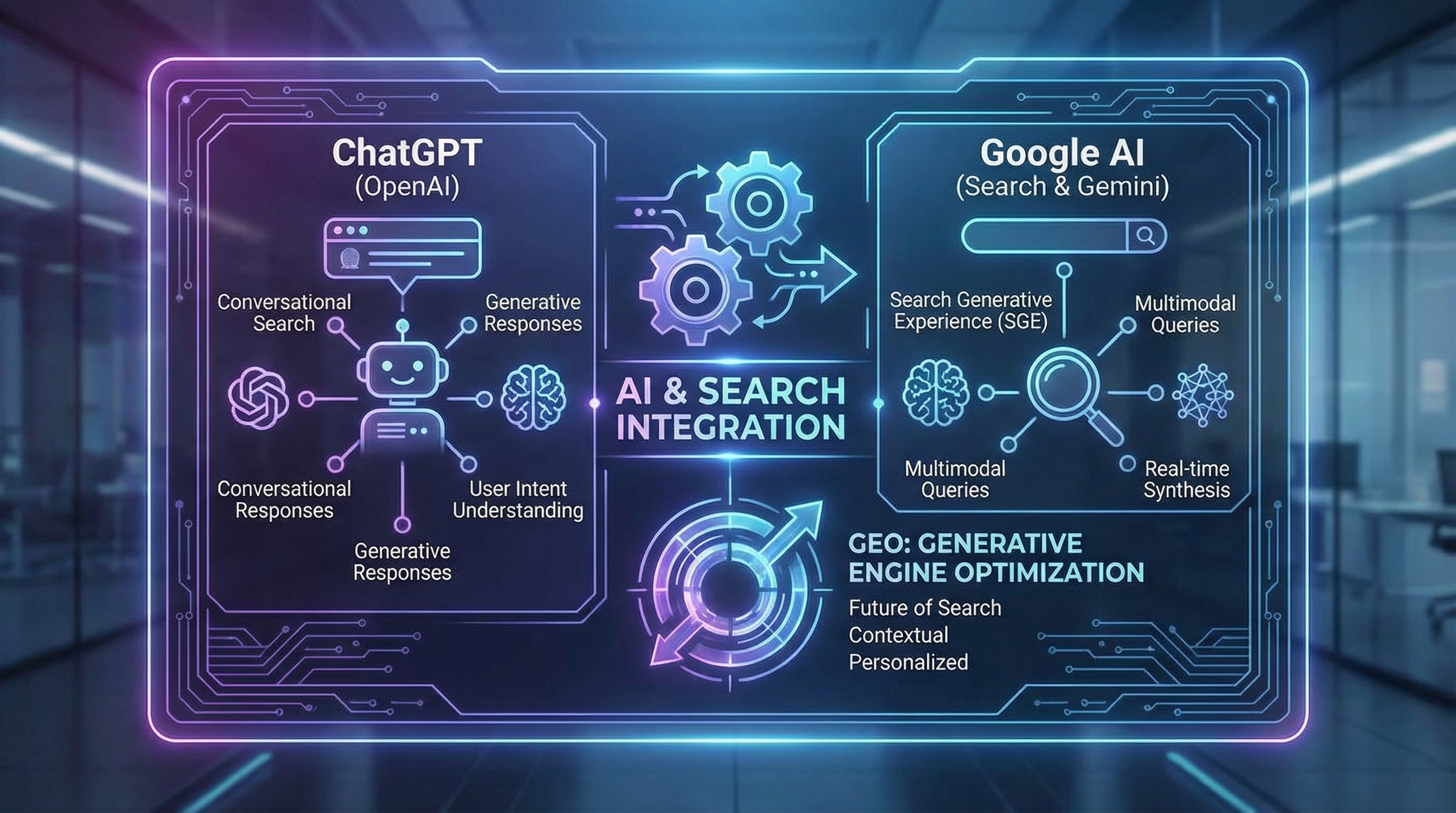Generative Engine Optimization
Stay Visible. Stay Relevant. Stay Ahead. Optimize your website for AI
Master the art of making your content discoverable, citable, and authoritative for AI-powered generative search engines that synthesize information rather than simply retrieve it.
What is Generative Engine Optimization?
Generative Engine Optimization (GEO) is the practice of optimizing digital content to be effectively discovered, understood, and cited by AI-powered generative search engines and language models. While traditional SEO focuses on ranking in search results, GEO aims to become the authoritative source that AI systems reference when generating responses.
The Fundamental Shift: From Ranking to Referencing
Traditional search engines return a list of links; generative engines create comprehensive answers. This shift transforms the optimization landscape:
Rank #1 for target keywords
Become the trusted source AI systems cite when answering questions
Key Differences Between SEO and GEO
| Aspect | Traditional SEO | Generative Engine Optimization |
|---|---|---|
| Primary Focus | Keyword rankings | Entity authority & topical expertise |
| Content Strategy | Keyword-optimized pages | Comprehensive knowledge resources |
| Success Metrics | Rankings, traffic, CTR | Citations, authority scores, AI visibility |
| Technical Priority | Site speed, mobile-first | Structured data, semantic markup |
| Link Building | Backlink quantity/quality | Knowledge graph connections |
| Content Format | User-facing optimization | Machine-readable comprehension |
Core Components of GEO Strategy
Building Your Entity Home
Your website must serve as the definitive source about your brand entity. This requires comprehensive About pages with detailed company history, leadership information, and mission statements. Entity disambiguation becomes crucial when differentiating from similarly named entities, while maintaining consistent NAP (Name, Address, Phone) information across all platforms. The ultimate goal is knowledge panel optimization through structured data that triggers Google Knowledge Panels and establishes your entity's authority.
Schema Markup Excellence
Implement comprehensive schema markup:
{
"@context": "https://schema.org",
"@type": "Organization",
"name": "Your Brand Name",
"url": "https://www.yourdomain.com",
"logo": "https://www.yourdomain.com/logo.webp",
"description": "Comprehensive description for AI understanding",
"sameAs": [
"https://www.facebook.com/yourbrand",
"https://www.linkedin.com/company/yourbrand",
"https://en.wikipedia.org/wiki/Your_Brand"
],
"founder": {
"@type": "Person",
"name": "Founder Name",
"jobTitle": "CEO"
}
}The Pillar-Cluster Model 2.0
Create comprehensive topic clusters that demonstrate expertise through interconnected content. Pillar pages should contain 3,000+ word authoritative guides (like this one), supported by detailed subtopic explorations. The key lies in semantic internal linking that creates meaningful connections between related content, combined with a regular update cadence to maintain freshness and relevance.
Expert-Level Content Requirements
The new standard for authoritative content goes beyond surface-level information. Original research through proprietary studies provides unique value that AI systems prioritize. Data visualization through citable charts and infographics makes complex information accessible. Including insights from recognized authorities adds credibility, while comprehensive coverage that addresses every aspect of your topic ensures you become the definitive source.
Beyond Basic Schema
Implement advanced structured data types that help AI systems understand your content's context and purpose. FAQ Schema enables direct answers to common questions, while How-To Schema provides step-by-step instructions that AI can reference. Article Schema establishes publication details and authorship credentials. Dataset Schema makes your proprietary data discoverable and citable. Event Schema ensures time-sensitive information is properly understood, and Product Schema delivers detailed product information in a machine-readable format.
JSON-LD Best Practices
{
"@context": "https://schema.org",
"@type": "FAQPage",
"mainEntity": [{
"@type": "Question",
"name": "What is Generative Engine Optimization?",
"acceptedAnswer": {
"@type": "Answer",
"text": "Generative Engine Optimization (GEO) is the practice of optimizing content for AI-powered search engines that generate comprehensive answers rather than returning links."
}
}]
}Making Content Citation-Worthy
Creating content that AI systems want to cite requires a strategic approach to information presentation. Statistical claims must be specific and verifiable, providing concrete data points that AI can confidently reference. Unique insights that offer perspectives not found elsewhere become valuable citation material. Clear attribution makes it easy for AI to properly credit your source, while structuring key points as standalone, quotable insights increases the likelihood of citation.
Citation Signals for AI
Establishing credibility involves multiple layers of trust signals. Detailed author bios with relevant credentials demonstrate expertise. Clear, schema-marked timestamps for publication dates help AI understand content freshness. A transparent update history documents when content is refreshed, maintaining relevance. Third-party validation through awards, certifications, and external recognition strengthens your source credibility in AI evaluation systems.
Frequently Asked Questions
Ready to Master Generative Engine Optimization?
The future of search is generative, and the time to optimize for it is now.
